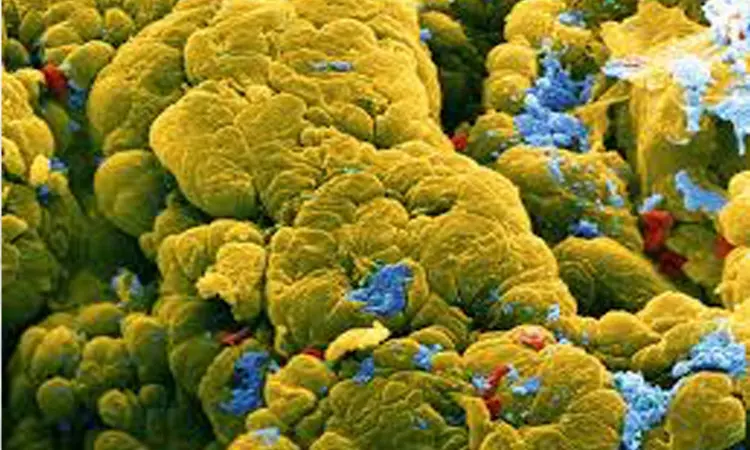- Home
- Medical news & Guidelines
- Anesthesiology
- Cardiology and CTVS
- Critical Care
- Dentistry
- Dermatology
- Diabetes and Endocrinology
- ENT
- Gastroenterology
- Medicine
- Nephrology
- Neurology
- Obstretics-Gynaecology
- Oncology
- Ophthalmology
- Orthopaedics
- Pediatrics-Neonatology
- Psychiatry
- Pulmonology
- Radiology
- Surgery
- Urology
- Laboratory Medicine
- Diet
- Nursing
- Paramedical
- Physiotherapy
- Health news
- Fact Check
- Bone Health Fact Check
- Brain Health Fact Check
- Cancer Related Fact Check
- Child Care Fact Check
- Dental and oral health fact check
- Diabetes and metabolic health fact check
- Diet and Nutrition Fact Check
- Eye and ENT Care Fact Check
- Fitness fact check
- Gut health fact check
- Heart health fact check
- Kidney health fact check
- Medical education fact check
- Men's health fact check
- Respiratory fact check
- Skin and hair care fact check
- Vaccine and Immunization fact check
- Women's health fact check
- AYUSH
- State News
- Andaman and Nicobar Islands
- Andhra Pradesh
- Arunachal Pradesh
- Assam
- Bihar
- Chandigarh
- Chattisgarh
- Dadra and Nagar Haveli
- Daman and Diu
- Delhi
- Goa
- Gujarat
- Haryana
- Himachal Pradesh
- Jammu & Kashmir
- Jharkhand
- Karnataka
- Kerala
- Ladakh
- Lakshadweep
- Madhya Pradesh
- Maharashtra
- Manipur
- Meghalaya
- Mizoram
- Nagaland
- Odisha
- Puducherry
- Punjab
- Rajasthan
- Sikkim
- Tamil Nadu
- Telangana
- Tripura
- Uttar Pradesh
- Uttrakhand
- West Bengal
- Medical Education
- Industry
Sedentary Lifestyle, High-fat Diet, Being Male Increase Risk of Colon Cancer

Rockville, Md. - A new study in mice teases out the nuances of sex differences and lifestyle influences on colon cancer risk. The research will be presented virtually at the American Physiological Society's (APS) New Trends in Sex and Gender Medicine conference.
Colon cancer is the third leading cause of cancer-related death in the U.S., and death rates among people younger than 55 have been steadily increasing. The American Cancer Society had estimated that about 53,200 people would die from colorectal cancer in 2020, including 3,640 adults younger than 50. A better understanding of the factors that contribute to colon cancer and the mechanisms behind protective factors could help address this trend.
A cross-institutional research team started by comparing an inflammatory marker associated with colon cancer risk in both male and female mice on a control diet. At baseline, males showed higher levels of this inflammatory marker.
Next, they provided mice unlimited access to an exercise wheel. After 12 weeks of exercise, the males' inflammation marker dropped to equal that of the females.
Researchers then introduced a high-fat diet. The high-fat diet increased inflammation in both sexes. Interestingly, when a high-fat diet was combined with exercise, only females showed a reduction in gut inflammation.
Further examination of colon tissue through a clinical measure called the proliferation index reinforced these findings. A higher proliferation index score indicates the greater the risk of disease. Females scored nearly 15% lower than males. Similarly, exercise reduced index scores by more than 30%.
"Taken together these findings suggest that males respond poorly to high-fat diet, causing inflammation and increased cell proliferation, making them at greater risk for colon cancer," researchers wrote.
https://www.physiology.org/professional-development/meetings-events/new-trends-in-sex-and-gender-medicine?SSO=Y
Hina Zahid Joined Medical Dialogue in 2017 with a passion to work as a Reporter. She coordinates with various national and international journals and association and covers all the stories related to Medical guidelines, Medical Journals, rare medical surgeries as well as all the updates in the medical field. Email: editorial@medicaldialogues.in. Contact no. 011-43720751
Dr Kamal Kant Kohli-MBBS, DTCD- a chest specialist with more than 30 years of practice and a flair for writing clinical articles, Dr Kamal Kant Kohli joined Medical Dialogues as a Chief Editor of Medical News. Besides writing articles, as an editor, he proofreads and verifies all the medical content published on Medical Dialogues including those coming from journals, studies,medical conferences,guidelines etc. Email: drkohli@medicaldialogues.in. Contact no. 011-43720751


